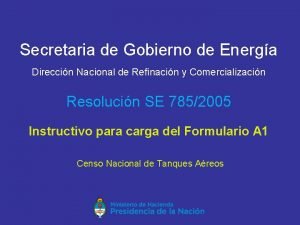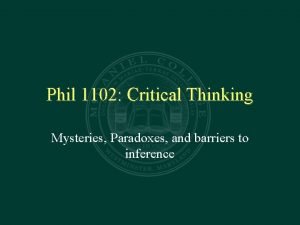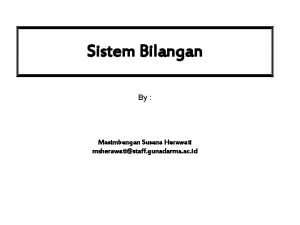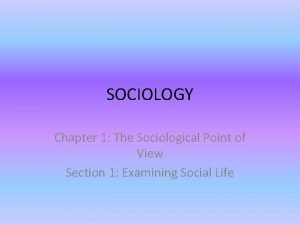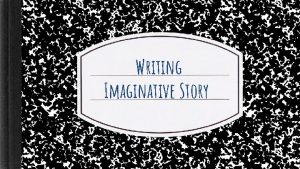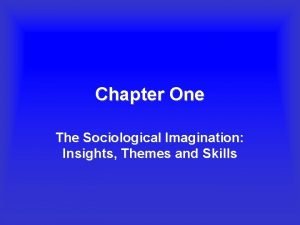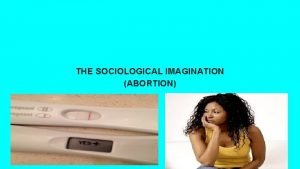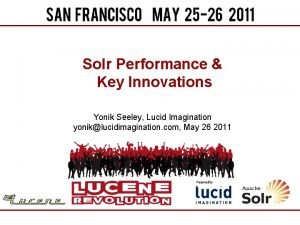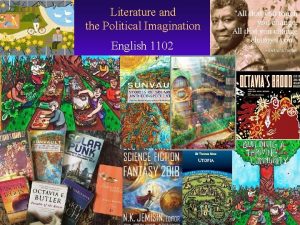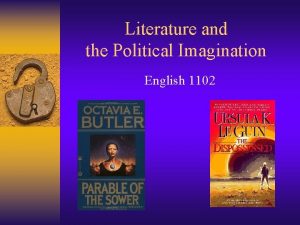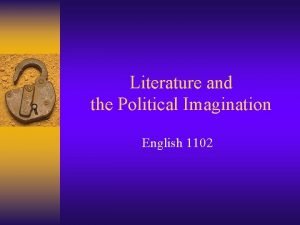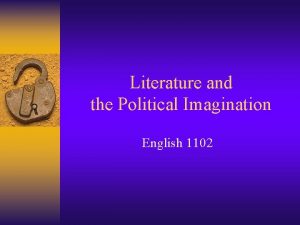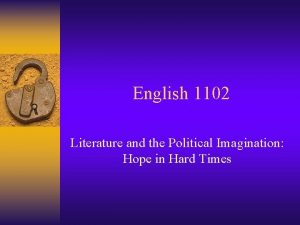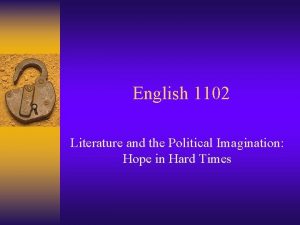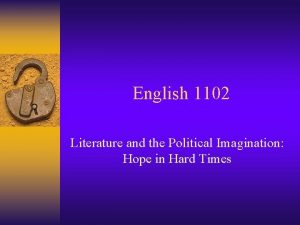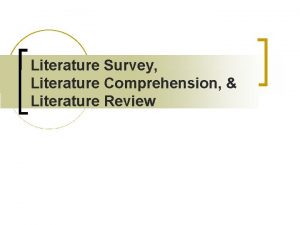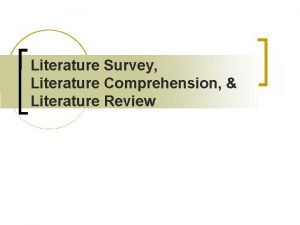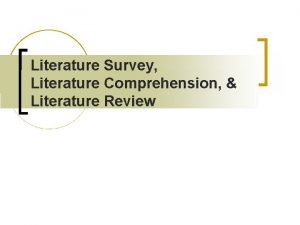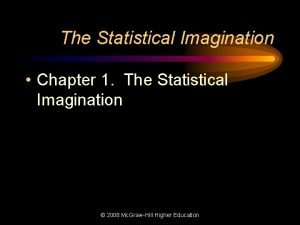Literature and the Political Imagination English 1102 English















- Slides: 15

Literature and the Political Imagination English 1102

English 1102 – Week Seven Welcome! We’ll get started in a few minutes. Say hello in the chat; keep video on please To prepare, please open: More’s Utopia (link in Blackboard discussion/email) Plato’s Republic (in readings package) Please note: library skills session is scheduled for Thursday, Nov 5, 12: 30 pm (here in zoom) Assignments coming up: Friday: First essay (final version) Sunday: Notes for Individual World Building (two parts) In class next Thursday: five minute presentation

More’s Utopia First published 1516 The title Utopia is a play on words: eu topos (beautiful place) ou topos (no place) Frame narrative (story within a story) “Blueprint, satire, or something else? ” Influence as wide as Swift’s Gulliver’s Travels, Marx, Star Trek, as well as Le. Guin, Jemisin, and what came to be known as Utopian and dystopian literature “dystopia” (‘bad place’) coined by John Stuart Mill in 1868, in response to More

More’s Utopia Frame Narrative: story told within a story Conversation between More (the character, distinct from the author) and a character named Raphael Hathloday (Hathloday: “pedlar of nonsense”) In Part One More encourages Hathloday, a sailor, to sit and eat and talk wiith him and his friend Peter Giles, and to share his knowledge of an island not too far away, where Hathloday says the people have devised an ideal society, in contrast to critiques of England earlier in the book Part Two is Hathloday’s account of the island

More’s Utopia Satire, or blueprint? Utopia or dystopia? More (1478 -1535) was from a well connected family, became a lawyer, and later became Lord Chancellor of England under King Henry VIII. In contrast to the ideas in Utopia, in real life, as Lord Chancellor More imprisoned, tortured, and executed heretics (ie protestants) More was later imprisoned and beheaded for opposing Henry VIII’s divorce to Catherine of Aragon; Henry VIII had broken with the Catholic church and adopted Protestantism, ushering in the Protestant Reformation

More’s Utopia Supports slavery (21, 40, 53, 54, 77, 81) Rigid gendered hierarchy inside families (78, 80 -81) Pressure to euthanize for the old and disabled (78) Change houses by lots (43) Representative democracy to choose leaders who in turn choose prince (44) No need of property, gold and jewels used to mark slaves, or as toys for children (6061), or for chamber pots (59) No lawyers (82)

Utopic Which inspires you to feel hope? More’s Utopia Dystopic

Plato’s Republic Plato (429? – 347 B. C. E. ), ancient Greece The Republic (circa 375 B. C. E. ) is part of the Dialogues, in which Socrates is a central figure Socrates was Plato’s teacher; most of what we may know of Socrates comes to us through Plato (are we hearing the ideas of Socrates, or of Plato? ) Socratic method: dialogue and question posing, logic and reason Discussion at a dinner party about the nature of justice, the just city and the just man, and what the ideal city would be

Plato’s Republic 1016 – 1022 – supervise the stories (songs, music, plays) and expunge any that say anything bad about the gods 1050 – 1051 the Noble Falsehood: people of bronze, silver, and gold (1100) Philosopher Kings

Utopic Which inspires you to feel hope? Plato’s Republic Dystopic

World building : clearly defined Clearly defined worlds

World building As we see in The Republic and Utopia, it is tempting when imagining a good world to imagine ourselves ‘at the top’ looking down, making decisions for the population. However, this tendency in Utopian thought tends to create rigid, conformist, hierarchical social engineering. Imagining the world ‘from below’ and creating a world in which ordinary people have power over their lives, and say in how their society is run, creates more generative and multifarious futures. To build a good world, power needs to be in the hands of those who act ‘from below, ’ who know the most about what would be good for society as a whole. Often, when those at the bottom are free, everyone is free

World building Integration of form and content: When you imagine your ‘good world, ’ or ‘good society, ’ integrate visual, spatial, and sensory elements with the politics and values of your world. How do form and meaning relate? Sources: https: //aesthetics. fandom. com/wiki/Solarpunk https: //marvelcinematicuniverse. fandom. com/wiki/Kimoyo_Beads

Thinking about Parable of the Sower Arguably, Butler’s Parable both predicts and generates the future. It describes ecological, social, and political crises that the author extrapolated into the future from conditions in her time. It has been described as prescient. At the same time, Butler’s work, and Earthseed, have encouraged a generation of younger writers to write themselves, their loved ones, their bodies, speech, cultures, back into the present and the future, when fiction had until recently erased them. Dreaming themselves into the future in turn allows people erased or distorted by the dominant culture to know themselves and to organize for the world they want, a world of dignity for all. Imagine a world that was free of the forms of structural oppression that are in our world. Who would you be? Who would your community be? What would you look like? What clothes would you wear? What would your home look like? How would you organize your days? What would your superpower be? How would you use your gifts for the good of all?

English 1102 – Week Seven Please note: library skills session is scheduled for Thursday, Nov 5, 12: 30 pm (here in zoom) Assignments coming up: Friday Oct 23: First essay (final version) Sunday Oct 25: Notes for Individual World Building (two parts) In class next Thursday: five minute presentation (practice in advance and time yourself)
 Ingresar al sistema web res. 1102-404 y res. 785
Ingresar al sistema web res. 1102-404 y res. 785 Comp sci 1102
Comp sci 1102 Chemsheets amino acids
Chemsheets amino acids Phil 1102
Phil 1102 Sistem bilangan desimal adalah
Sistem bilangan desimal adalah With lots of imagination and new ideas
With lots of imagination and new ideas By adopting a sociological imagination
By adopting a sociological imagination Psychodynamische imaginative traumatherapie
Psychodynamische imaginative traumatherapie Objectives of story writing
Objectives of story writing Destination imagination 2001
Destination imagination 2001 Empowering imagination
Empowering imagination The sociological imagination chapter 1 summary
The sociological imagination chapter 1 summary Lucid imagination
Lucid imagination Immersion interaction imagination
Immersion interaction imagination How sociologists view social problems: the abortion dilemma
How sociologists view social problems: the abortion dilemma Solr
Solr
